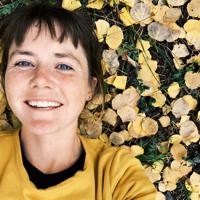I enter the rapid in the right spot and try to paddle away from the big lateral waves at the bottom, but the current is faster than I am strong and sucks me toward them. A big wave crashes on my left side and in slow motion my packraft turns on its side and dumps me out. I hold onto the boat and my paddle, elated that I’m floating.
Then, suddenly, something sucks me down into the water. My boat and paddle are yanked from my hand. My eyes shoot open in panic. I twirl in a sea of green — bubbles all around me. I can’t tell which way is up, so I let the water have me as I rotate in a gravity-less orb just hoping my PFD (personal flotation device) is strong enough to right me.
As I begin to run short on air, a brief thought of dying flashes fearfully through my mind. Then finally the water above me lightens. The sky! My head bursts out and I gasp.
Inhaling some water with the air, I choke, and seeing a boat just in front of me I swim to it. A friend pulls me into the raft, and I sit there coughing out the water but feeling a wave of happiness and exhilaration as I realize I’m okay. All that’s left is some water in my ears.
At a time when water is the most sacred resource in the arid U.S. Southwest, opening my eyes inside the Colorado River felt exceptionally awing. I’ve had many an intimate interaction with the Grand Canyon in Arizona, but this felt the deepest, even if it was just a few seconds long.
Seeing into another world — one we often only ever see the surface of — develops a new sense of place. When every one of your senses is enveloped by a single element, it momentarily makes you feel like just another atom; small and insignificant but simultaneously part of something much bigger.
I was talking to my dad recently and, as an artist and generally smart guy, he’s good at philosophizing on life and nature. He’s also good at reminding me of the details that aren’t readily noticed.
He talked about the giant snowflakes falling from the sky, “They were big enough to hold in your hand,” he said. And he continued to talk about how the snowflake itself is both a prism of light reflecting and refracting every which way as well as a prison of water trapped in a delicate structure. This is a lot like the green water and bubbles that, to be honest, I’m scared of seeing because it means I’m swimming — a beautiful dichotomy of sorts.
As I rafted down the length of the entire Grand Canyon with 15 other people for nearly a month’s time, we gradually shed our surface layers and got to know each other. We dove into topics of love and life and big dreams. We laughed a lot and even cried some too. We ran naked on the beach and went on long hikes through the canyons. We learned how each person deals with fear and stress as we faced big rapids, and we learned how each person relaxes and lets loose.
And better yet, everyone was kind and respectful and never let anyone be less than themselves. At a time when our world is fragile — war and climate change rocking the human race — it made me realize that people can be good and kind and have a deep respect for this place we call home and for each other.
I woke up early most mornings while everyone was still asleep and sipped my coffee in my tent while watching the sky brighten. The last star — I think a planet, actually — sat quietly amongst the clear sky. The canyon walls would gradually change from dark silhouettes to definable rock faces until the first burst of sun would strike the upper rim. And as the sun worked down the walls, we floated through its narrow rays between the chasms.
At night the moon began to light up the walls as it waxed to full near the end of the trip. One night in particular, the light of the moon illuminated a rock face that looked so sheer, as if it belonged next to Yosemite National Park’s Half Dome, not in the striated layers of the Grand Canyon.
The month went by so quickly, but we noticed the lengthening nights. Stress of home trickled in, and I commented that sometimes we say, “going back to reality,” but I think living outside beneath the sun and stars, and sleeping in the dirt, is the most real and genuine thing we humans can still do. There is a lot we worry about in life that doesn’t really matter.
Now I’m back home in Colorado, running in the snow. These have been my first running steps since getting anterior cruciate ligament (ACL) surgery three months ago. The soft snow feels like I’m back in the sand by the river’s edge, feeling extra grateful for this life.
Call for Comments
Have you had any big adventures like this lately, that made you feel more connected to the world around you?

